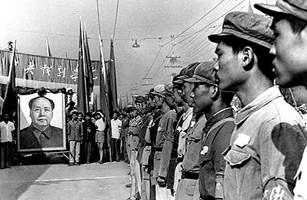
Beijing youths display their fervent allegiance to Mao.
Aug. 5, 1966
The summer heat lay oppressively low on Shanghai, and Zheng Mingyi, 14, turned to the radio hoping for a diversion from the soaring mercury. What he heard that day changed his life and the lives of every citizen in the most populous nation on earth. In urgent tones, a news reader announced that Mao Zedong was exhorting citizens to rise up and "bombard the headquarters" to rid the party of his rivals and enemies. That day the Great Proletarian Cultural Revolution, announced two months before, took hold.
Schools were shuttered and swarms of youths dubbed Red Guards began rampaging through the streets persecuting and sometimes killing anyone who was rich or educated or just plain outspoken. The madness lasted for a decade, during which millions were thrown into labor camps or forcibly relocated from cities to farms. The simplest things became crimes: wearing Western clothing, hoarding a slice of meat, forgetting a line from Mao's Little Red Book.
For Zheng, the crackly radio message that day meant the dissolution of his family. He and his four siblings were dispersed across the country to remote villages as punishment for having a teacher as a father. By the time Zheng returned home seven years later, his father had been tortured by Red Guards and was dead.
It was a tale repeated exponentially across the nation. Even now when Zheng hears the radio start up, he shivers at what message the newscaster might bring.